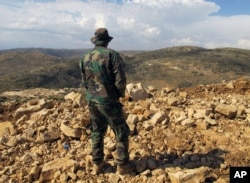Iran is bolstering its military presence in Syria, deploying a top army unit to the country in what commanders call an advisory mission, according to state-run media.
Iranian Brigadier General Ali Arasteh, deputy chief liaison of the army's ground force, said the unit comprises "commandos" in a force from the 65th NOHAD — a Persian abbreviation for Airborne Special Forces Brigade.
"We are sending commandos from army's Brigade 65 and other units to Syria as advisers," Arasteh told the Tasnim news agency.
The first unit of 35 elite members, also known as Green Beret Forces, are stationed near Aleppo in northern Syria. They are offering training to Syrian regime rapid reaction units, sources in Iran and Syria told VOA.
The move bolsters an already robust Iranian military presence in Syria, analysts say.
The commandos will supplement an elite Iranian military fighting unit that has been supporting Syrian President Bashar al-Assad's forces in the civil war against Syrian rebels and Islamic State.
Previous support
In the last two years, Iran has sent thousands of its Revolutionary Guard Corps (IRGC) to fight ground battles for the Syrian regime, joining with Iranian-backed Hezbollah fighters from Lebanon.
Tehran reportedly increased the number of IRGC personnel in Syria in the final months of 2015, sending as many as 3,500 militia fighters to the frontlines to defend Zeinab Shrine, a holy site for Shi'ite Muslims in the southern suburbs of Damascus.
In the Iranian military structure, the IRGC and the army are separate units and are sometimes seen as rivals, analysts say.
The IRGC is a paramilitary force formed after the Iranian Revolution in 1979 and is designed to protect the Islamic system. The army is considered less elite and focuses on internal and border controls, analysts say.
"IRGC is the trustworthy military wing of the regime after Iran's 1979 revolution, and [the] Iranian army has always [been] considered second to IRGC as it was inherited from the Shah regime," said Daryoush Babak, a former member of the Iranian special forces.
"Despite its extraordinary strength and proven military capabilities, this unit has always been ignored by high-ranking military officials," he told VOA.
In recent weeks, though, Iran's army has looked to broaden its reach.
Countering IS
The army announced that it launched a rapid reaction force to counter IS, even though IS has not been a threat inside Iran.
Ahmad Reza Pourdastan, commanding officer of the ground forces of the Iranian army, said the unit will be permanently on high alert.
"This force is very agile and monitors all kind of threats as far as 40 kilometers of Iranian borders," Pourdastan told reporters last month. "This would be a very reliable force, able to deploy on a very short notice."
The addition of Iran's army into Syria signals that Tehran is attempting to expand its sphere of influence in Syria as Russian forces in recent weeks have withdrawn.
"The army has long desired to enter Syria, but was prevented by the IRGC, which jealously guards its monopoly over ‘export’ of the revolution," said Ali Alfoneh, a Washington-based IRGC analyst. "Iranian Supreme Leader Khamenei, however, authorized the army to deploy advisers in Syria."
VOA's Sirwan Kajjo contributed to this report.





